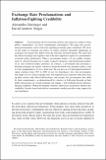Exchange Rate Proclamations and Inflation-Fighting Credibility
Author(s)
Guisinger, Alexandra; Singer, David Andrew
DownloadSinger_Exchange Rate.pdf (387.5Kb)
PUBLISHER_POLICY
Publisher Policy
Article is made available in accordance with the publisher's policy and may be subject to US copyright law. Please refer to the publisher's site for terms of use.
Terms of use
Metadata
Show full item recordAbstract
If governments choose economic policies that often run counter to their public commitments, are those commitments meaningless? We argue that government proclamations can be critical in signaling economic policy intentions. We focus on the realm of exchange rate policy, in which countries frequently implement an exchange rate regime that differs from the officially declared regime. We argue that the official exchange rate regime is one of the most important signals of a government's economic policy preferences. When a government makes a de jure public commitment to a fixed exchange rate, it sends a signal to domestic and international markets of its strict monetary-policy priorities. In contrast, a government that proclaims a floating exchange rate signals a desire to retain discretion over monetary policy, even if it has implemented a de facto fixed rate. We use data on 110 developed and developing countries from 1974 to 2004 to test two hypotheses: first, that governments that adopt de facto fixed exchange rates will experience less inflation when they back up their actions with official declarations; and second, that governments that abide by their commitments—as demonstrated by a history of following through on their public declarations of a fixed exchange rate regime—will establish greater inflation-fighting credibility. Within developing countries, democratic institutions enhance this credibility. Results from fixed-effects econometric models provide strong support for our hypotheses.
Date issued
2010-04Department
Massachusetts Institute of Technology. Department of Political ScienceJournal
International Organization
Publisher
Cambridge University Press
Citation
Guisinger, Alexandra, and David Andrew Singer. “Exchange Rate Proclamations and Inflation-Fighting Credibility.” International Organization 64.02 (2010): 313. Web.© 2010 Cambridge University Press.
Version: Final published version
ISSN
0020-8183
1531-5088